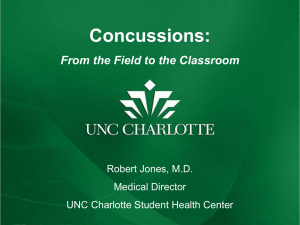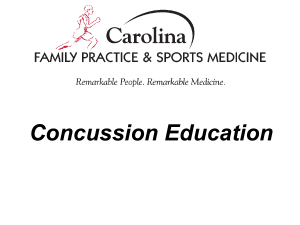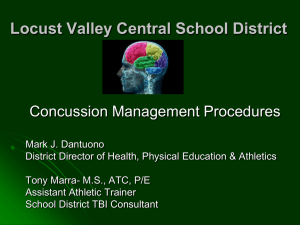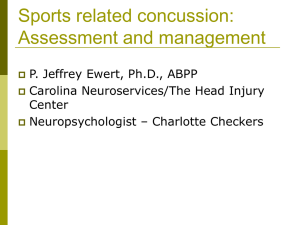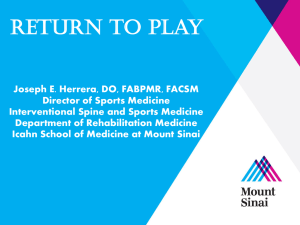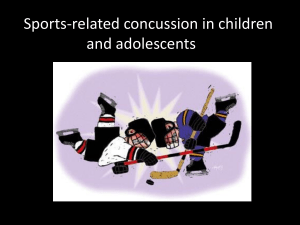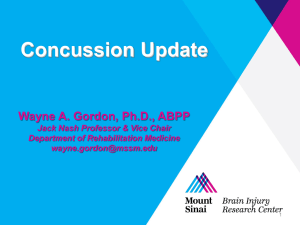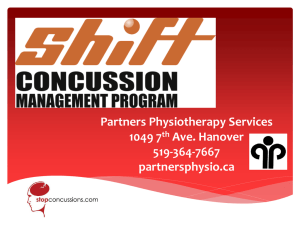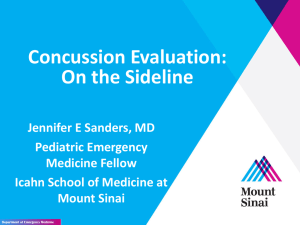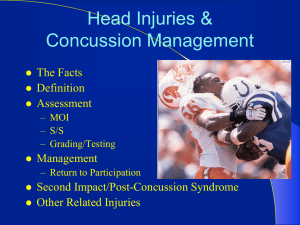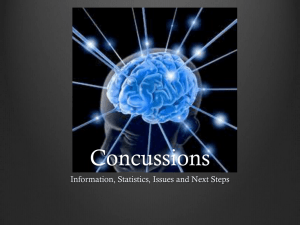Successful Return to Learn After Concussion
advertisement
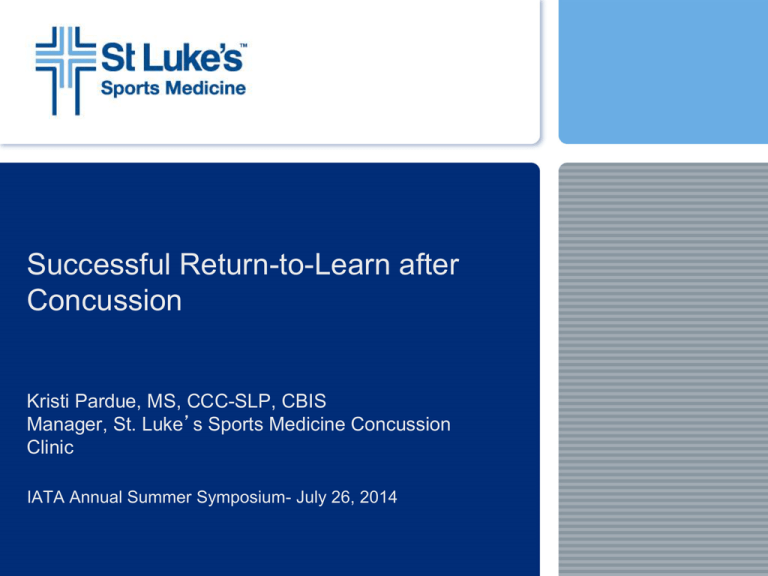
Successful Return-to-Learn after Concussion Kristi Pardue, MS, CCC-SLP, CBIS Manager, St. Luke’s Sports Medicine Concussion Clinic IATA Annual Summer Symposium- July 26, 2014 Talking Points • Discuss concussion symptoms and their direct impact on academics • Discuss how to utilize return-to-learn for student athletes after concussion • Discuss academic adjustments • Review the 504 plan process and benefit to students • Discuss successful team member communication • “The majority (80-90%) of concussions resolve in a short (7-10 day) period, although the recovery time frame may be longer in children and adolescents.” • “Concussion is considered to be among the most complex injuries in sports medicine to diagnose, assess and manage.” McCroy P, et al. Br J Sports Med 2013 Student Athlete Multidisciplinary Team to Facilitate “Return to Learning” Pediatrics Vol. 132, Number 5, Nov. 2013 School Team - Physical School Team – Academic Coaches Athletic Trainers School Nurse PE Teacher Teachers Nurse Counselor Administrators School Psychologist Education & Collaboration Supporting Students Family Team Parents Student Grandparents Peers Teammates Family Friends Medical Team Emergency Department Primary Care Provider/Pediatrician Concussion Specialist Neuropsychologist Common Symptoms PECS • Physical • Emotional • Cognitive • Sleep Physical • • • • • • • • • Headache Nausea Vomiting Balance problems Dizziness Visual problems Fatigue Sensitivity to light Sensitivity to noise Emotional • • • • Irritability Sadness More emotional Nervousness Cognitive • • • • Feeling mentally foggy Slowed thinking Difficulty concentrating Difficulty remembering Sleep Drowsiness Sleeping less than usual Sleeping more than usual Trouble falling asleep Most Common “Thinking” Cognitive Problems Post Concussion Fatigue, specifically Mental fatigue Difficulty concentrating Slowed processing speed ** feels like being converted from high speed internet to dial up internet Difficulty with working memory **The ability to temporarily store and manage information during complex cognitive processes such as learning and reasoning Difficulty converting new learning into memory Emotional symptoms McAvoy, K., The REAP Project Rocky Mountain Youth Sports Medicine Institute Secondary Problems • Depression or anxiety • Can emerge or increase due to medical distress and uncertainty, or due to inability to participate in sport or other social activities. • Academic stress • Social isolation Balancing Medical Needs & Academic Needs RTL & RTP • In order to return-to-play, students must be symptom free. • This does not apply to return-to-learn. We want to ensure returning to learn doesn't worsen symptoms, but they do not have to be symptom free before starting this process. The longer we keep students out of school, the harder it is to transition back from an academic, as well as a social perspective. • Increasing evidence that children and adolescent patients benefit from a controlled, gradual return-to-learn approach, rather than an attempt to return to full school load after cognitive rest has resulted in symptom reduction. Master, Gioia, Leddy and Grady Pediatric Annals Sept. 2012. Return-To-Learn Plan Stage Activity Objective No Activity Complete cognitive rest-no school, no homework, no reading, not texting, no video games, no computer work Recovery Gradual reintroduction of cognitive activity Relax previous restrictions on activities and add back for short periods of time (5-15 minutes at a time). Gradual controlled increase in subsymptom threshold cognitive activities. Homework at home before school work at school Homework in longer increments (2030 minutes at a time). Increase cognitive stamina by repetition of short periods of selfpaced cognitive activity. School re-entry Part of school after tolerating 1-2 cumulative hours of homework at home. Re-entry into school with accommodations to permit controlled subsymptom threshold increase in cognitive load Increase to a full day of school. Accommodations decrease as cognitive stamina improves. Introduce testing, catch up with essential work. Full return to school; may commence Return-to-Play protocol. Gradual reintegration into school Resumption of full cognitive workload Source: Master, Gioia, Leddy, Grady Helping Students Recover from a Concussion: Classroom Tips for Teachers CDC concussion resources • Key Points: • Work with students and their parents to identify the type and length of activities your students can handle and create a plan on how to address any school work they may have missed. • Tailor the plan to each student. Take into account your student’s age, type of symptoms, level of understanding, and emotional status. No two students are alike in the concussion symptoms they have and how they recover from a concussion. • Coordinate the classroom changes with your students’ other teachers and other school professionals, so they have the same level of support throughout the school day. Helping Students Recover from a Concussion: Classroom Tips for Teachers CDC concussion resources Others to Consider • Student agenda to be used by student to track assignments, test dates, and communication log between student, teacher and parents. • Non-essential work not to be made up so that student can keep up. • Student is not to have more than 2 hours of homework per evening. • Student is not to take more than one test/exam on the same day. • State tests-should be delayed or excused until they are asymptomatic. • Fire drills When is it time to consider more structured accommodations? 504 Accommodation Plans • Definition• Section 504 of the Rehabilitation Act of 1973 • Civil Rights Law • Purpose is to protect the rights of individuals with disabilities in programs and activities that receive federal assistance from the Dept. of Education. • Eligible when have a physical or mental impairment which substantially limits one or more major life activities. • **Levels the playing field; providing a comparable opportunity. • Qualification • Identify-parents, teachers, doctors, student, nurse, counselor • Evaluate- disability? Individual needs? • Placement-team decision based on qualifying factors 504 Accommodation Plans • Purpose • the 504 protects the student’s rights by providing a formal document to ensure all teachers, parents, coaches, school staff members are on the same page regarding the student’s needs. And most importantly, the student. • Benefits • structure and communication • Time frame • appropriate to implement a 504 Plan as long as a student exhibited or reported symptoms that might limit his/her ability to learn. • In place and review at least on yearly basis. Concussion is more dynamic so need to review more frequently. Complex cases request meeting in 2 weeks. Multidisciplinary Team to Facilitate “Return to Learning” Pediatrics Vol. 132, Number 5, Nov. 2013 School Team - Physical School Team – Academic Coaches Athletic Trainers School Nurse PE Teacher Teachers Nurse Counselor Administrators School Psychologist Education & Collaboration Supporting Students Family Team Parents Student Grandparents Peers Teammates Family Friends Medical Team Emergency Department Primary Care Provider/Pediatrician Concussion Specialist Neuropsychologist Standardized Process of Communication • Explain your role in caring for the student athlete. Ongoing communication from diagnosis to clearance. • • • • School RN Teachers Counselors Parents • What is the best way to communicate? • How can everyone work together to keep an eye on student in each environment? Ongoing Communication Needs • Any member of the team who is under-informed reduces the chance for success. • Daily and weekly communication. • The student may not be the best reporter or historian, in their current condition. • Feedback is essential from all parties – request feedback if it has not already been addressed. • Not every concussion is the same – we learn something new nearly every time. • Ongoing communication to all team members as student recovers with documentation completed as needed. Consistent Messaging Regarding Return to Learn Collegiate Level Athletes http://brain101.orcasinc.com/ Kristi Pardue M.S.,CCC-SLP,CBIS Manager, St. Luke’s Sports Medicine Concussion Clinic p: (208) 381-2665 parduek@slhs.org
